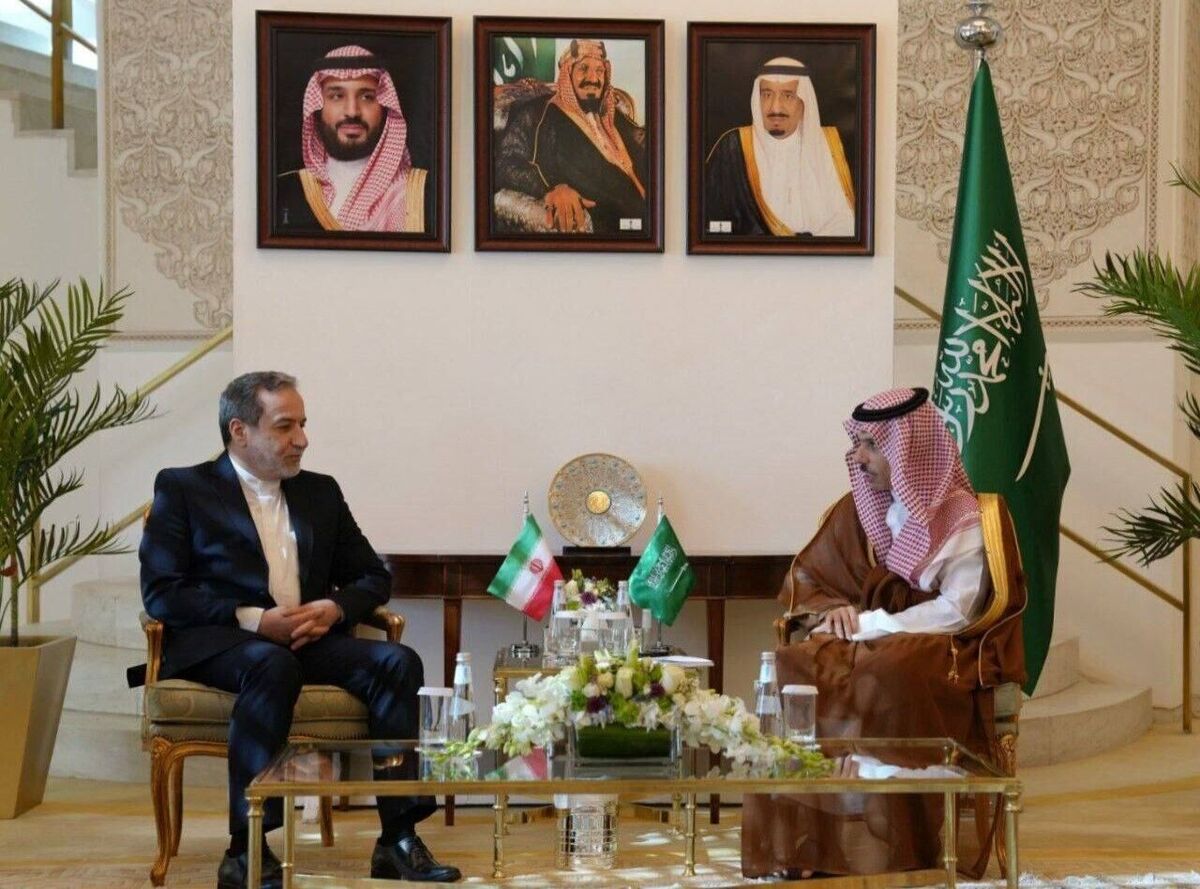Araghchi-bin Salman meeting
The most important part of Riyadh visit was Araghchi's meeting with the Saudi Crown Prince Mohammed bin Salman, with the media describing the atmosphere of the meeting friendly and warm as the two sides discussing bilateral and regional issues.
After this meeting, Araghchi wrote on X that "geography always keeps us neighbors, and faith always makes us brothers. Together, Iran and Saudi Arabia can bring security and stability to the region, and this requires a higher level of political will. I am happy that today we took the first steps in a long way with my Saudi counterpart."
He continued that he held very important discussions on vital issues of common concern with the king-in-waiting bin Salman.
"The Israeli regime is leading the entire region towards a catastrophe. The region needs vigilance, wisdom, courage and cooperation to overcome this challenging time," he went on.
The first part of Araghchi's message refers to the fact that although regional developments, especially the continuation of the Israeli regime's attacks on Gaza and the crisis in Lebanon and the subsequent rising tensions between Iran and Israel regime cast a shadow over this trip and most of the media outlets have covered this visit from this point of view, the bilateral relations have been top on the agenda of the FM's discussions with the Saudi officials as the new Iranian government led by President Masoud Pezeshkian has voiced its readiness to settle all the differences with the Persian Gulf Arab monarchies in the recent Asian Cooperation Summit in Doha, Qatar.
Iran and Qatar struck a Chinese-brokered rapprochement deal in March 2023 to restore their relations after 7 years of hiatus. But during this period, despite the expressed interest and emphasis of the parties to restore and develop economic relations at the same level as political relations, this important issue has not made significant progress, and therefore, examining ways of investment or commercial exchanges and removing obstacles to the expansion of economic relations have become the most important concerns of economic diplomacy of Iran's foreign ministry.
While Saudi Arabia imported goods and services amounting to $211 billion in 2023, a detailed examination of customs data in 2023 shows the total value of trade between Iran and Saudi Arabia is less than half a million dollars, an issue showing that despite the détente, there is still a long way to reach the previous levels of trade between the two countries.
Reviewing the risks of Israeli scenario for the region
Certainly, an important part of the talks of FM Araghchi with Saudi officials was influenced by the Palestinian and Lebanese developments. Iran and Saudi Arabia are two regional powers in West Asia and the Islamic world whose cooperation can help maintain regional stability and settle existing challenges and crises.
On the first anniversary of the war crisis in Gaza, the Israeli regime has proven that it is seeking to develop and expand crisis to other regions, including Lebanon, and has no intention of stopping its killing machine amid unceasing Western support.
Last week, after a period of strategic patience against a series of criminal acts of Tel Aviv in the assassination of resistance leaders and high-ranking military advisors of the IRGC, Iran carried out Operation True Promise II against the military and strategic centers of the Israeli regime.
In response, the Israelis are threatening Tehran with a retaliation, and since the history has proven that the most important instrument and strategy for Israel is use of air power, the Israeli distance from Iran can prove challenging when it comes to use of fighter aircraft since they have to fly over several counties to reach Iran.
In the meantime, many analysts and media have announced that during Araghchi's visit to Riyadh, Iran informed the countries of the Persian Gulf Cooperation Council that allowing the use of its airspace against Tehran is unacceptable.
On the other hand, it is very clear and predictable that the Israeli regime is eyeing the support of the American military capabilities in the Persian Gulf for any evil plan, and it is also very possible that in the event of an action by the Israelis, Iran will launch new attacks even more powerfully. In this case, if Washington supports Tel Aviv using its military bases in the Persian Gulf, Tehran will hold responsible the origin of the actions against its territory.
Iran has repeatedly announced it does not seek to widen the crisis and finds the Israelis the only beneficiaries of expanded conflict. So, Saudi Arabia as an influential country in the Arab world should take more seriously the risks of the Israeli cabinet's hawkish policies. Meanwhile, the widespread support of the Lebanese nation to Hezbollah after the assassination of Hezbollah's Secretary-General Sayyed Hassan Nasrallah and the full support of Iran and other branches of Axis of Resistance for Lebanon have shown that the Saudis should not make a strategic miscalculation regarding the possibility of weakening and destroying Hezbollah in Lebanon and continuation of the war can endanger interests of all of the regional countries./129

